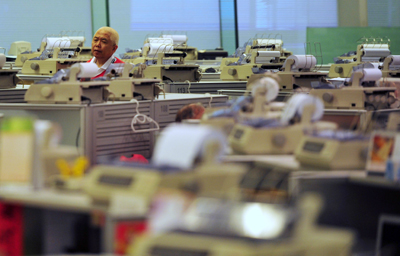Wednesday, 12 August 2015 09:37
 HONG KONG: Asian shares fell on Wednesday after China cut the yuan against the dollar for a second day, fuelling concern about the health of the world’s number two economy.
HONG KONG: Asian shares fell on Wednesday after China cut the yuan against the dollar for a second day, fuelling concern about the health of the world’s number two economy.
The dollar rose after the People’s Bank of China (PBoC) reduced the value of the yuan against the greenback, trimming the reference rate by 1.62 percent, state media reported.
The cut comes after Beijing’s surprise devaluation of the yuan on Tuesday sent ripples through global financial markets, prompting a wave of selling in equities and commodities.
Chinese shares opened sharply lower, with Hong Kong dropping 1.49 percent and Shanghai falling 1.19 percent in early trades.
Other regional markets also lost ground, with Tokyo dipping 1.23 percent, Sydney down 0.50 percent, while Seoul lost 1.21 percent.
China’s central bank devalued its yuan currency Tuesday by nearly two percent against the US dollar, as authorities said they were seeking to push market reforms in a one-time move.
Officials will now use the previous day’s close, foreign exchange demand and supply and the rate of other major currencies to decide the daily rate around which the Chinese currency can trade.
But investors feared Beijing’s move signalled concerns over growth in the world’s second-largest economy, which came after data published over the weekend showed a slump in Chinese trade.
“Worries about China’s economic slowdown are once again taking centre stage,” Hiroichi Nishi, a manager at SMBC Nikko Securities, told Bloomberg News.
“China probably devalued the yuan because it wants to see a recovery in exports.”
Wall Street tumbled on the move, with the Dow Jones Industrial Average, S&P 500 and Nasdaq Composite Index all closing down around one percent or more.
Companies which rely on China as a major growth market for their products were hit particularly hard, with Apple dropping 5.2 percent and General Motors 3.5 percent.
Commodities also lost ground over concerns that demand is set to fall in Asia’s biggest economy — a major importer of energy, metals and grains — with oil sinking to a six-year low.
US benchmark West Texas Intermediate for delivery in September was at $ 43.02 a barrel on Wednesday morning, after hitting $ 43.08 in New York — the lowest level since March 2009.
European benchmark Brent oil for September delivery fell to $ 48.86, from $ 49.18 a barrel in London.
Safe-haven gold fetched $ 1,110.81 compared to $ 1,110.35 late Tuesday.
The dollar also rose in Tokyo, building on gains overnight, changing hands at 125.21 yen early Wednesday, against 125.12 yen in New York late Tuesday.
“There has been an incredible rally in US dollar buying with the currency crosses against emerging markets in particular seeing major moves,” said Angus Nicholson at IG Markets.
The euro, meanwhile, strengthened to $ 1.1053 and 138.39 yen compared with $ 1.1042 and 138.15 yen in US trade, after Greece’s government clinched a deal a 85 billion euros ($ 94 billion) international bailout.
In individual companies, Commonwealth Bank of Australia, the country’s biggest bank, reported its full-year net profit rose five percent to a record Aus$ 9.063 billion (US$ 6.62 billion).
Shares in the financial institution were put in a trading halt as it announced a Aus$ 5 billion capital-raising to meet tougher regulatory requirements.




























